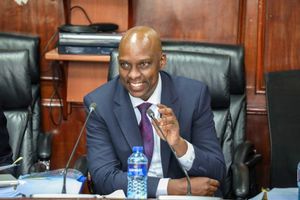
The government has been blocked from shutting or disrupting internet services to stifle communication during protests, pending the determination of a case filed by several organisations.
The government has been blocked from shutting or disrupting internet services to stifle communication during protests, pending the determination of a case filed by several organisations.
Citing three previous shutdowns, the four organisations moved to the High Court seeking appropriate reliefs for the June 25, 2024 shutdown and aim to deter future violations.
The lobby groups said the restriction of the internet on three occasions in 2023 and 2024 constitutes a blatant violation of Kenyans’ constitutional rights to freedom of expression, media freedom, access to information, and the full realisation of economic and social rights in an increasingly digital society.
Justice Bahati Mwamuye issued orders restraining Communications Authority of Kenya (CA), CS ICT, and Digital Economy and internet service providers from disrupting internet services, including blocking social media platforms, pending the determination of the case.
The judge further directed the government and the internet services providers to collate and preserve all information, documents, material, correspondence, directions, and memoranda related to the alleged previous wholesale shutdown or blockage of the services.
The petitioners, including the International Commission of Jurists (ICJ-Kenya), Bloggers Association of Kenya (BAKE), and Kenya Union of Journalists (KUJ), expressed fears of a repeat internet shutdown, including during the 2027 General Elections, exams, or protests.
“This legal action responds to credible evidence of deliberate interference, including internet throttling during the 2024 Gen Z Protests and the blocking of social media platform, Telegram, during the 2023 and 2024 Kenya Certificate of Secondary Education (KCSE) Examinations,” the petition stated.
The lobby groups want the court to declare that, whereas the right of access to the internet is a right not in the Bill of Rights, it is recognised or conferred by law.
“The right of access to the internet is inherent in Kenya’s Constitution and the Bill of 132 Rights. Internet shutdowns violate the fundamental right of access to the internet,” the lobbies said.
The organisations further want a declaration that the internet shutdowns violate various articles in the constitution on opinion, expression, media, information, association, assembly, political rights, and consumer rights.
They submitted that the internet enables the enjoyment of rights and freedoms while enhancing transparency and accountability in public and private spheres.
Internet shutdowns, they submitted, are powerful markers of sharply deteriorating human rights situations.
“Internet shutdowns also have major economic costs for all sectors, disrupting, for example, financial transactions, commerce, and industry. Yet, in Kenya, internet freedom is increasingly imperiled by emerging digital authoritarianism,” lawyer Dudley Ochiel said.
They pointed out that on June 25, 2024, during the protests on the Finance Bill 2024, the government illegally shut down the internet.
“The June shutdown coincided with an unprecedented attack on fundamental rights and freedoms in which nearly 60 Kenyans were killed by state agents,” said the groups, adding that no law or court order sanctioned the internet shutdowns or the suspension of Telegram in 2023.
The lobbies claimed that during the shutdown in June last year, which lasted several days, there were loss of businesses amounting to millions of shillings, disproportionately affecting small businesses and women.
“The internet is no longer a luxury but a critical enabler of political discourse, economic transactions, and even emergency response systems. Any restrictions must satisfy stringent legal tests under Article 24 of the Constitution, which are legality, necessity, and proportionality – standards systematically ignored in Kenya’s recurrent, arbitrary disruptions,” the lobbies said.
The organisations said, given the positive obligation of States to promote and facilitate the enjoyment of human rights, governments should take all steps necessary to ensure that all individuals have meaningful access to the internet.
“On the same grounds, States should refrain from interfering with access to the internet and digital communications platforms unless such interference is in full compliance with the requirements of the applicable human rights instruments,” Mr Ochiel said in an affidavit.
The lobbies further want a declaration that the state must make public any law or court order restricting fundamental rights unless there is a countervailing public interest reason for secrecy.






